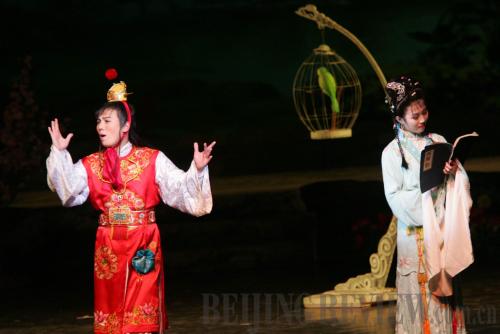|
 |
|
TRAGIC LOVE: A scene of the North Korean version of A Dream of Red Mansions depicts the love between the two protagonists Jia Baoyu and Lin Daiyu (CFP) |
North Korea's Phibada Opera Troupe arrived in Beijing on May 3, bringing with it a Korean opera adapted from China's classic novel A Dream of Red Mansions written by Cao Xueqin (around 1715-63), a great novelist of the Qing Dynasty (1644-1911). The troupe, invited by the Chinese Ministry of Culture, is one of the largest performing groups having visited China in recent years.
The North Korean musical adaptation was staged in Beijing from May 6-9. Of the four performances in Beijing, two were open to the public. Nine hundred tickets for each performance were sold out in two days. Ticket prices ranged from 180 yuan ($26.50) to 1,680 yuan ($247). The last time there was such great box office record was when Hollywood blockbuster Avatar screened. Even before the performing troupe arrived at its next destination Hohhot, capital of Inner Mongolia Autonomous Region, tickets had already been sold out .
The exotic rendition greatly impressed the Beijing audiences. Everything of the opera was seen a perfection, from stage setting, to singing, moves, costumes, facial expression and the conveying of emotions.
The North Korean version stays true to the original novel. The opera features 10 scenarios in six acts. It tells the love story of the protagonists Jia Baoyu and Lin Daiyu, with climaxes of Lin's death and Jia's running away from home. The songs in the opera are rendered in the style of Korean folk songs, and the script is taken from the original Chinese text.
Some people said the music, dance and lighting effects rival those of a Broadway production.
A highlight of the opera was the elaborate stage setting, which faithfully reflected the prosperity of the two rich families portrayed in the novel. The pavilions, as well as the desks, tea tables, chairs and beds used on stage, were constructed according to the novel's depictions.
To accentuate the tragic aspects of the love of Jia and Lin, the traditional Chinese musical instrument, the erhu, was used extensively. Korean folk music instruments and Western music instruments were also used, which added both traditional and modern touches to the opera and made it more appealing to audiences.
"From the development of the opera's plot and the subtle expression of the characters' emotions, we were aware North Korean artists had shown respect for the classics," said a spokesperson from the Hunan Arts & Culture Foundation, which coordinated the performances in Hunan Province.
The North Korean troupe is scheduled to stay in China for about a month. After its debut in Beijing, the troupe left the capital city to perform in other cities including Hohhot, Changsha, Wuhan, Fuzhou, Shenzhen and Chongqing. The troupe has a tight schedule of nearly 30 performances, each lasting nearly three hours.
Painstaking efforts
The Phibada Opera Troupe is one of North Korea's leading national performance troupes. The word Phibada in Korean means "a sea of blood," and the troupe got its name from adapting North Korean classic Sea of Blood into opera. In 2008, the troupe staged the North Korean opera The Flower Girl in China. It was assigned to produce an operatic rendition of A Dream of Red Mansions by North Korea leader Kim Jong Il, who gave personal advice during the production of the opera.
To find the actors and actresses that best fit the roles, the troupe hosted nationwide competitions and finalists were voted on by the public. Actors and actresses playing leading roles are mostly students or recent graduates of art schools, and they are young and vibrant.
"A national selection for leading roles is unprecedented in North Korea, where people are usually ranked by seniority," Zhu Yingjie, a former cultural counselor in the Chinese Embassy in North Korea, told the Beijing-based International Herald Leader.
Young actor Kim Il Hwang, whose grandfather played the same role in a 1961 version of A Dream of Red Mansions, starred in the role of Jia. His father is also a folk singer in the Phibada Opera Troupe. During the rehearsals, his grandfather and father often came to the theater to give instructions to him.
The costumes and actions of the North Korean actors and actresses are similar to China's TV version of A Dream of Red Mansions produced in 1987. China also sent two groups of experts to North Korea in 2008 and 2009 to instruct the Korean performers. China also provided costumes, reference materials, photos and props for the performance.
Kim Jong Il's father Kim Il Sung, the late leader of North Korea, also liked A Dream of Red Mansions very much. In 1961, he watched a Yueju Opera version of the novel during a visit to China. In the autumn that year, Shanghai Yueju Opera Troupe staged the opera during a visit to North Korea. Kim Il Sung decided to have Chinese classics adapted into a North Korean folk opera. He gave advice on the performances, and watched one of them together with the late Chinese leader Deng Xiaoping during Deng's visit to North Korea.
Kim Jong Il had the opera staged again to mark the 60th anniversary of the establishment of diplomatic ties between China and North Korea. On September 25, 2009, the opera went on show in the East Pyongyang Grand Theater, and was an instant hit. On October 4, 2009, Chinese Premier Wen Jiabao watched it together with Kim Jong Il during a visit to North Korea. So far, the opera has been performed 50 times, entertaining nearly 100,000 people.
| 